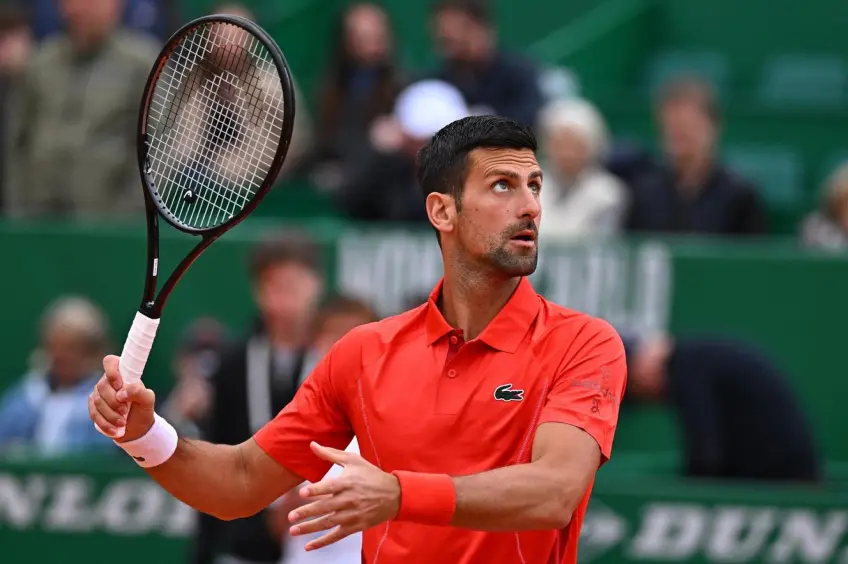
Novak Djokovic’s 2024 season was a mix of contrasting highs and lows, providing a surprising narrative for a player so accustomed to dominating the sport. While Djokovic’s year saw him reach a major milestone by capturing the gold medal at the Paris Olympics—a career-defining moment that completed his quest for an elusive Olympic title—the rest of the season was far from what fans and pundits expected. After an extraordinary 2023 in which he secured three Grand Slam titles, the prospect of Djokovic failing to claim a single trophy in 2024 seemed nearly impossible. Yet, this is exactly what transpired, leaving many to ponder whether his age and the relentless pursuit of excellence have begun to take their toll.
The former world No. 1, now 37 years old, encountered a year of unexpected defeats and setbacks that kept him from adding to his already legendary résumé. Jannik Sinner proved to be a thorn in Djokovic’s side, besting him in the semifinals of the Australian Open and again in the final of the Rolex Shanghai Masters. Meanwhile, Carlos Alcaraz halted Djokovic’s quest for a record-extending 25th Grand Slam title at Wimbledon, showcasing the changing of the guard at the pinnacle of men’s tennis.
Despite these stinging defeats, Djokovic did manage to qualify for the 2024 Nitto ATP Finals. However, his decision to withdraw from both the Rolex Paris Masters and the season-ending ATP Finals in Turin came as a surprise and sparked debate among fans and analysts. The reasoning behind his decision was straightforward: Djokovic is focusing solely on the few remaining goals he holds dear, namely winning Grand Slams and representing Serbia in the Davis Cup. With the 2025 Australian Open already on his radar, Djokovic appears content to conserve his energy for the moments that truly matter to him. Unlike previous years, he will enter Melbourne not as the overwhelming favorite but positioned behind rising stars like Sinner and Alcaraz, potentially alleviating some of the pressure that has always accompanied his pursuits.
The 2024 season also revealed troubling trends for Djokovic. For the first time since 2017, and only the second time since 2011, he concluded the year without a Grand Slam title—a stark contrast to his usual dominance. Moreover, he did not win a single title throughout the entire year, a feat that is as shocking as it is concerning given his historic consistency. Adding to these woes was a negative statistical quirk: Djokovic finished four matches in 2024 without earning a single break point, a rare and concerning indicator of his struggles. These matches included losses to Alex de Minaur in the United Cup quarterfinals, Jannik Sinner at the Australian Open semifinals and the Shanghai final, and a surprising defeat to Alejandro Tabilo in the third round of the Italian Open.
Much of Djokovic’s challenges this year stemmed from the emergence of younger stars like Sinner and Alcaraz. Both have displayed remarkable resilience and skill against Djokovic, showing no fear of the Serbian legend’s stature or achievements. As Djokovic prepares to turn 38 in 2025, he remains optimistic, convinced that he still has more Grand Slams within his reach. “Deep down, I still feel like I have a few more Grand Slams to win,” Djokovic shared during a revealing interview with *La Nacion*. “That’s what drives me to compete, to feel like I can still do it, and to play the Davis Cup for Serbia. I love playing for Serbia. Tennis is still my biggest platform for sharing messages that I care about, whether it’s related to tennis, society, or business. I still feel that I enjoy the process, so why not?”
Djokovic’s complexity as a public figure has always intrigued fans and critics alike. His candid reflections during the interview shed light on a man shaped by profound experiences. From his childhood during the war in Serbia, where his city was bombed and he witnessed immense suffering, to his role as a father, Djokovic’s motivations extend far beyond the tennis court. “What makes me vulnerable? More than anyone can imagine—the children. My kids, of course, but others too. I’m always emotional with them, but when I became a father… when I see children suffering, it breaks my heart,” he said, his words reflecting a deep empathy and a passion for using his platform to create positive change. He continued, “I lived through the war; my city was bombed day and night. I saw dead people. Now that there are wars again in other countries, I don’t understand… These questions are for politicians.”
Djokovic’s vulnerability and emotional resonance are often at odds with the image of a fiercely competitive athlete. Yet, this humanity makes him a compelling figure in sports and beyond. He cares deeply about societal issues, from child welfare to environmental causes, and channels this passion into his life’s work both on and off the court.
Looking ahead, many insiders speculate that 2025 could be Djokovic’s final year competing at the highest level. The retirements of Roger Federer, Rafael Nadal, and Andy Murray—the trio with whom he defined an era—leave Djokovic in a uniquely isolated position. Without his greatest rivals, finding motivation could prove challenging. However, if his words and past achievements are any indication, Djokovic will continue to give his all, chasing a few more moments of greatness before the curtain finally falls on his legendary career. Whether or not he succeeds, his indelible impact on the sport is already assured.
Leave a Reply